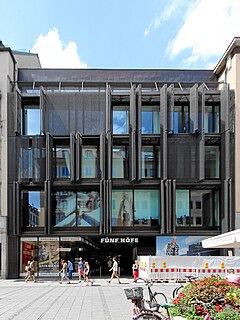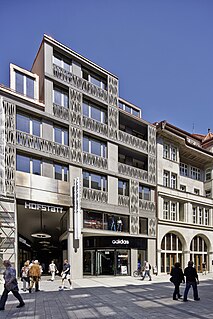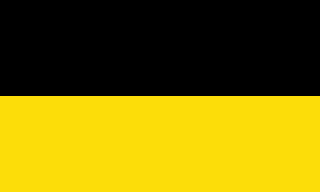 | |
| Location | Pasing, Munich, Germany |
|---|---|
| Address | Josef-Felder-Street 53, 81241 Munich |
| Opening date | 15 March 2011 [1] |
| Developer | mfi Management für Immobilien |
| Architect | Allmann Sattler Wappner |
| No. of stores and services | 150 |
| Total retail floor area | 63,000 m2 |
| No. of floors | 3 |
| Parking | 1,000 |
| Website | www |
The Pasing Arcaden is a shopping mall located in Munich's district of Pasing. The first section of the Pasing Arcaden was opened on the 15 of March 2011. It is located near the Pasing train station, in the west of Munich. [2]

A shopping mall is a modern, chiefly North American, term for a form of shopping precinct or shopping center, in which one or more buildings form a complex of shops representing merchandisers with interconnecting walkways that enable customers to walk from unit to unit. A shopping arcade is a specific type of shopping precinct which is usually distinguished in English for mall shopping by the fact that connecting walkways are not owned by a single proprietor and are in open air. Shopping malls in 2017 accounted for 8% of retailing space in the United States.

Munich is the capital and most populous city of Bavaria, the second most populous German federal state. With a population of around 1.5 million, it is the third-largest city in Germany, after Berlin and Hamburg, as well as the 12th-largest city in the European Union. The city's metropolitan region is home to 6 million people. Straddling the banks of the River Isar north of the Bavarian Alps, it is the seat of the Bavarian administrative region of Upper Bavaria, while being the most densely populated municipality in Germany. Munich is the second-largest city in the Bavarian dialect area, after the Austrian capital of Vienna.

Pasing is a district in the city of Munich, Germany, and part of the borough Pasing-Obermenzing.
The main entrance at the Pasing train station square opens up to the 270 meter long first section of the shopping area. This portion of the complex has a total area of 26,000 m2 and offers 14,000 m2 of space for 90 shops and boutiques. [2] [3] On 18 February 2013, the second section of Pasing Arcaden with an additional 50 shops and 11 catering establishments covering an area of 37,000 m2 was opened. Giovanni Trapattoni was the star guest at the opening. [4]

Giovanni Trapattoni, sometimes popularly known as "Trap" or "Il Trap", is an Italian football manager and former footballer, considered the most successful club coach in the history of Serie A. A former defensive midfielder, as a player he spent almost his entire club career with A.C. Milan, where he won two Serie A league titles, and two European Cups, in 1962–63 and 1968–69. Internationally, he played for Italy, earning 17 caps and participating in the 1962 FIFA World Cup in Chile.
The total area of the Pasing Arcaden covers 63,000 m2, in which the total commercial area covers 39,000 m2. Making the Pasing Arcaden the fourth major shopping mall in Munich, after the Einkaufs-Center Neuperlach – pep, the Olympia-Einkaufszentrum, and the Riem Arcaden.

The Einkaufs-Center Neuperlach – pep is a shopping mall in Munich's Neuperlach borough operated by ECE. With a floor space of 60,000 square meters and about 135 specialty shops, it was according to a survey for the year 2002, the most profitable shopping center in Germany, the average revenue per square meter was twice as high as the national average. In designing the state capital, it is recognized as an integrated site with the function of a district center, and through its size has an important role for the entire southeast of the metropolitan Munich.
The Riem Arcaden is the third largest shopping mall in Munich after the Olympia-Einkaufszentrum and the Einkaufs-Center Neuperlach – pep. It was built according to the design of Allmann Sattler Wappner in the Riem Messestadt district at the Willy-Brandt-Platz and opened on 10 March 2004.
The building was designed by the Munich architecture office of Allmann Sattler Wappner. The floor plan was designed similar to that of a cruise ship. The façade was designed with diamonds made of metal. The side of the building, adjacent to the railway tracks from Pasing to München Hauptbahnhof, is slightly curved, and the building height is more than 20 meters. The opposite longitudinal side of the building is approximately 10 meters high. The reason for this being the 45 three-to-five room apartments that were built in diagonal blocks on the roof of the Pasing Arcaden. Between the apartment blocks are large terraces that are available to the tenants. Additional commercial area has been planned. [5]
Allmann Sattler Wappner Architekten is a German architecture firm based in Munich. Established in 1987, it has existed in its current form since 1993. In 1997, Allmann Sattler Wappner Architekten received the German Architecture Award. Among many other buildings they had designed the Dornier Museum in Friedrichshafen, the Herz Jesu Church and the Haus der Gegenwart in Munich. According to the firm they currently employ 60 members of staff.

München Hauptbahnhof is the main railway station in the city of Munich, Germany. It is one of the three long distance stations in Munich, the others being München Ost and München-Pasing. München Hauptbahnhof sees about 450,000 passengers a day, which puts it on par with other large stations in Germany, such as Hamburg Hauptbahnhof and Frankfurt Hauptbahnhof. It is classified by Deutsche Bahn as a category 1 station, one of 21 in Germany and two in Munich, the other being München Ost. The mainline station is a terminal station with 32 platforms. The subterranean S-Bahn with 2 platforms and U-Bahn stations with 6 platforms are through stations.
The walkways inside the shopping area do not run straight, but intertwine throughout the building. The shop facades are designed by the tenants themselves. Under the complex is a two-story underground parking area with 660 parking spaces. [5]
The management behind the Pasing Arcaden is the same as that for the Riem Arcaden, mfi Management für Immobilien AG, Essen. The first phase of construction costed a total of €190 million. The project schedule was delayed as a lawsuit with a neighbor interrupted construction works between 2008 and 2009. [5]

Essen is the central and second largest city of the Ruhr, the largest urban area in Germany. Its population of 583,393 makes it the ninth largest city of Germany, as well as the fourth largest city of the federal state of North Rhine-Westphalia. On the Ruhr and Emscher rivers, Essen geographically is part of the Rhineland and the larger Rhine-Ruhr Metropolitan Region. The Ruhrdeutsch regiolect spoken in the region has strong influences of both Low German (Westphalian) and Low Franconian.












